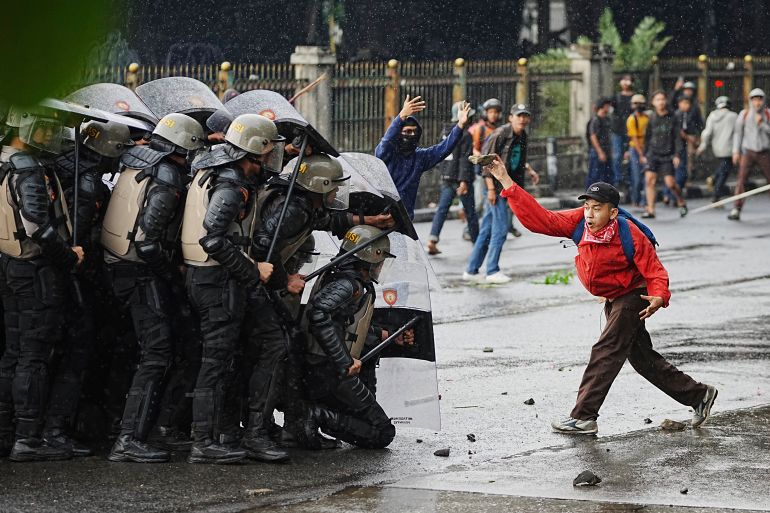Finance Minister Sri Mulyani Indrawati was among those ousted days after protesters raided her home.
Published On 9 Sep 2025
Indonesia’s President Prabowo Subianto has replaced five ministers in a lightning cabinet reshuffle after deadly protests rocked the Southeast Asian nation of 285 million people in recent weeks.
The cabinet shake-up on Monday follows rising public dissatisfaction with Prabowo’s administration and parliament’s perceived insensitivity over economic hardships affecting everyday people, which led to mass protests breaking out at the end of August.
Recommended Stories
list of 4 itemsend of list
Five ministers lost their jobs, including Finance Minister Sri Mulyani Indrawati, who previously served as the executive director of the International Monetary Fund (IMF) and managing director of the World Bank, and Budi Gunawan, the coordinating minister for politics and security.
Prabowo chose economist Purbaya Yudhi Sadewa, chairman of the Deposit Insurance Corporation, to replace Indrawati, who was one of Indonesia’s longest-serving finance ministers.
Indrawati’s replacement, Sadewa, 61, highlighted his experience at a news conference, noting he had provided fiscal expertise to the last two administrations.
The new finance minister said his focus is to speed economic growth by mapping out fiscal measures and ensuring that government spending is efficient without overhauling systems.
Prabowo also removed the ministers of cooperatives, youth and sport, and the minister for migrant workers protection.

Violent protests gripped the country last month after reports emerged that all 580 members of the House of Representatives received a monthly housing allowance of 50 million rupiah ($3,075), in addition to their salaries.
The housing allowance, introduced last year, was equal to nearly 10 times the minimum wage in Jakarta and even more for lower wages in rural areas.
The independent National Commission on Human Rights reported that 10 people died during the five-day protests and described an inhumane approach by security forces in handling the demonstrations.
Police have reported the protest death toll at seven.
Demonstrations also expanded following the death of 21-year-old motorcycle delivery driver Affan Kurniawan. He was reportedly completing a food delivery order when an armoured police car sped through a crowd of demonstrators and killed him.
With high rates of youth unemployment forcing many Indonesians to turn to precarious, low-paying work such as motorcycle taxi gig work, Kurniawan’s death prompted people to take to the streets.
The protests were swiftly met with police in riot gear, and water cannon and tear gas directed at activists, including on university campuses.
Prabowo told security forces to get tough on protests that showed signs of “treason and terrorism”.
But activists did not back down, targeting government buildings as well as the homes of several politicians during demonstrations, including ousted Finance Minister Indrawati’s home on August 31.
Calm has largely returned to the country after Prabowo revoked lawmakers’ perks and privileges last week, including the housing allowance, and suspended most of their overseas trips.
The protests were also fuelled in part by fears of the military expanding its authority under Prabowo, a former special forces military general once feared across Indonesia and banned from the United States, who rebranded himself in the lead-up to last year’s election.
